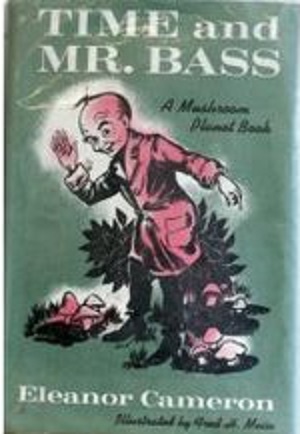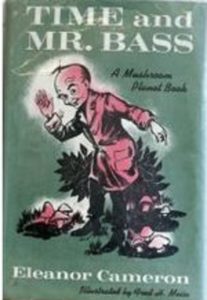Book Review: Time and Mr. Bass by Eleanor Cameron
Long ago and long ago and even before that, came the Mycetians to Earth from Basidium, the Mushroom Planet. Much of their history has been lost to Deep Time, but it is known that they were stranded on this planet, and eventually wound up settling in the mountains of Wales. In recent times, the new leader of the Mycetians, Tyco Bass, with the aid of human boys Chuck Masterton and David Topman, has re-established communications with the Mushroom Planet.
Mr. Bass and his young friends have had many fine adventures. A new one begins when it is learned that two relics of the Mycetian people have been stolen, the Necklace of Ta, and the Thirteenth Scroll, the latter said to have information about the missing years of Mycetian history–if anyone could read it. Our heroes must track down the thief and recover the items, but that will only lead to a battle against ancient evil!
This is the fifth and final book in the Mushroom Planet children’s science fiction series that began with The Wonderful Flight to the Mushroom Planet in 1954. Chuck and David, who live in Pacific Grove, California, see an ad in the newspaper asking for a rocketship to be built by clever boys, with a reward offered. They build a small ship out of materials lying around, meet Mr. Bass, who installs the parts to make the ship actually work, and fly to the invisible moon Basidium and meet its people.
Back in its day, this series was very popular, and it’s easy to see why. There’s fast-paced action, a general sense of wonder, and the ending is terrific as a farewell to the series.
However, in a number of ways the series is very dated. Real-life space exploration tore the suspension of disbelief for the invisible moon stuff, the paucity of decent female characters is notable, and as the stories went along they became much more science fantasy than science fiction.
The book falls fairly neatly into two sections. In the first, the stolen items must be recovered. This is made a bit complicated by the thief selling bits of the necklace to other people. The stones of Ta cause a person’s passions to become unhealthy obsessions with a Basidian twist. For an example, a doctor who wants to heal sick people becomes obsessed with mushrooms as a panacea for all ills.
Mr. Bass and the boys must appeal to each victim’s underlying true nature to get them to relinquish the stones. This bit had a very C.S. Lewis feel to it.
Introduced during this part, and taking center stage in the second half of the book, is Mycetian history. While Mr. Bass is over five hundred years old, and the story does convey something of how that affects him, he has a connection to an even older ancestor, the Bassyd. Elder Grandfather (as he is called by Mr. Bass) was a bard at the court of King Arthur, and had been given great powers by the Ancient Ones who later gave them to Mr. Bass.
But all his powers could not save Arthur if the king would not take his advice, and the other lords did not support their ruler. Also, both Arthur and the Bassyd had an enemy (whose name is never given but is nicknamed Narrow Brain) who was jealous of the Bassyd’s power and sought to steal the magic that the Bassyd did not have. After Arthur’s death at Camlann, Narrow Brain tracked down and murdered the Bassyd, burying him in an unknown location.
This somehow gave Narrow Brain a form of immortality and supernatural powers. We learn that the reason there’s no indisputable physical evidence of the reign of Arthur is because Narrow Brain down the centuries methodically destroyed it. With the loss of the Bassyd, the Mycetians also lost valuable knowledge of their past, and have slowly withered as a people ever since.
Now that the scroll has been recovered, the translation process (including a side trip to Basidium for more clues) attracts Narrow Brain’s attention, and the ancient evil strikes again and again in an attempt to prevent the truth from coming to light.
Of the boys, young dreamer David is more prominent than Chuck, as his second sight is repeatedly useful, while Chuck’s more grounded approach is de-emphasized.
These books (past the first) are now difficult to find; your best bet is libraries with superior children’s collections. Primarily recommended to readers with nostalgia for the 1950s-1960s, and secondarily to collectors of Arthuriana.


